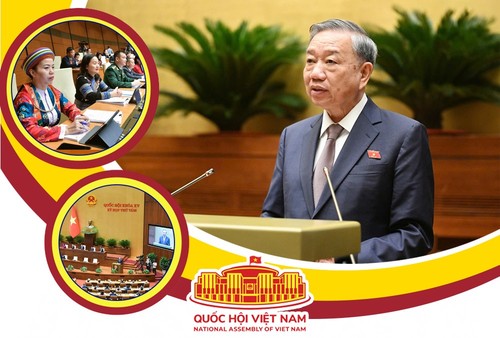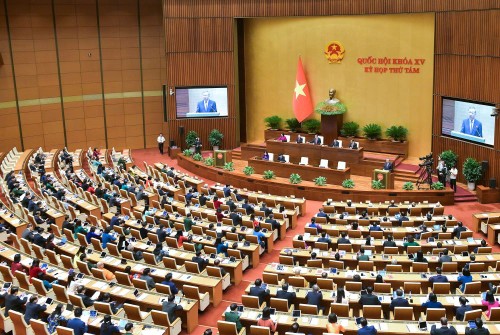 General Secretary To Lam asks for changing the mindset of law-making towards improving management while encouraging creativity to unlock resources for development (Photo: VGP) General Secretary To Lam asks for changing the mindset of law-making towards improving management while encouraging creativity to unlock resources for development (Photo: VGP)
|
The legal system is a measurement of a country’s developmental level, playing an essential role in managing social life. Along with promoting national renewal and a socialist-oriented market economy, Vietnam has refined a rule-of-law socialist state of the people, for the people, and by the people under the Party’s leadership, with law playing the core role.
 Mr. To Lam speaks at the opening of the 8th session of the 15th National Assembly (Photo: VGP) Mr. To Lam speaks at the opening of the 8th session of the 15th National Assembly (Photo: VGP) |
Legal system measures development level
Politburo Resolution 48 on a Strategy for building and perfecting Vietnam’s legal system by 2010, with a vision to 2020, sets out the aim of developing a “coordinated, consistent, feasible, open, and transparent” legal system, focusing on advancing a socialist-oriented market economy and building a socialist rule-of-law state of the people, by the people, and for the people.
The 13th National Party Congress in 2021 reinforced Resolution 48, adding requirements for a legal system that is “complete, timely, coordinated, consistent, feasible, open, transparent, and stable,” and taking the legitimate rights and interests of individuals and enterprises as a focus to boost innovation and promote a rapid, sustainable development.
A year later, the 13th Party Central Committee adopted Resolution 27, reaffirming the commitment to building a socialist rule-of-law state in the new period. This marked a new milestone and an important turning point.
For the first time, the Party adopted a Resolution specialized on a rule-of-law socialist state which identified key objectives, such as building a comprehensive legal system, enforcing its strict, consistent implementation, upholding the Constitution and law, and respecting and protecting human and citizen rights effectively.
Since Resolution 48 was adopted, the National Assembly from its 11th to its 14th tenure passed 300 laws, including the 2013 Constitution, the amended Land Law, the 2015 Law on Organization of Local Government, revised in 2019, the 2019 Law on Referendum, and the 2016 Law on Access to Information. In addition, numerous legal documents have been issued to guide and enforce these laws, ensuring greater consistency and coherence within the legal system.
Mindset change
It’s important to revolutionize legislative thinking in building and perfecting Vietnam's socialist rule-of-law state in the new period in order to create a democratic, equitable, humane, modern, complete, coherent, timely, and accessible legal system which will pave the way for innovation and sustainable growth.
In the article "Promoting the Party's characteristics in building Vietnam's socialist rule-of-law state" on October 20, 2024, General Secretary To Lam emphasized that laws of a rule-of-law socialist state must continuously evolve to reflect the Party’s guidelines and policies.
He said it’s important to ensure a strict, scientific, democratic law-making process, but it must also be flexible and policy-responsive to work out timely solutions to arising problems that may impede development, while upholding the principles of protecting and ensuring the interests of the nation and the people first and foremost.
During the opening session of the 15th National Assembly’s 8th session on October 21, General Secretary To Lam called for a shift in legislative thinking that balances effective governance with fostering creativity in order to unlock all productive forces and resources for development.
Mr. Lam said: "It’s important to ground laws in Vietnamese reality, learning from experience. We need to avoid both haste and excessive perfectionism, which could lead to missed opportunities. We need to center laws on the needs of people and businesses, create a legal framework to address emerging trends like the Industrial Revolution 4.0, artificial intelligence, and digital and green transformation. It’s important to create a legal framework to carry out digital transformation revolution and create breakthroughs for national development in the coming years."
Quality legislative work is vital to achieving the strategic breakthroughs outlined by the 13th National Party Congress. By reshaping law-making, Vietnam will not only build a robust socialist rule-of-law state but also unleash resources to support the national development goals.